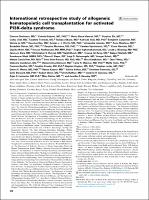| dc.contributor | Vall d'Hebron Barcelona Hospital Campus |
| dc.contributor.author | Dimitrova, Dimana |
| dc.contributor.author | Nademi, Zohreh |
| dc.contributor.author | Maccari, Maria Elena |
| dc.contributor.author | Ehl, Stephan |
| dc.contributor.author | Uzel, Gulbu |
| dc.contributor.author | Tomoda, Takahiro |
| dc.contributor.author | García Prat, Marina |
| dc.contributor.author | Soler Palacín, Pere |
| dc.date.accessioned | 2022-03-11T14:02:16Z |
| dc.date.available | 2022-03-11T14:02:16Z |
| dc.date.copyright | 2021 |
| dc.date.issued | 2022-01 |
| dc.identifier.citation | Dimitrova D, Nademi Z, Maccari ME, Ehl S, Uzel G, Tomoda T, et al. International retrospective study of allogeneic hematopoietic cell transplantation for activated PI3K-delta syndrome. J Allergy Clin Immunol. 2022 Jan;149(1):410-421.e7. |
| dc.identifier.issn | 0091-6749 |
| dc.identifier.uri | https://hdl.handle.net/11351/7151 |
| dc.description | Primary immunodeficiency; Lymphoproliferation; MTOR inhibitor |
| dc.description.abstract | Background
Activated phosphoinositide 3-kinase delta syndrome (APDS) is a combined immunodeficiency with a heterogeneous phenotype considered reversible by allogeneic hematopoietic cell transplantation (HCT).
Objectives
This study sought to characterize HCT outcomes in APDS.
Methods
Retrospective data were collected on 57 patients with APDS1/2 (median age, 13 years; range, 2-66 years) who underwent HCT.
Results
Pre-HCT comorbidities such as lung, gastrointestinal, and liver pathology were common, with hematologic malignancy in 26%. With median follow-up of 2.3 years, 2-year overall and graft failure–free survival probabilities were 86% and 68%, respectively, and did not differ significantly by APDS1 versus APDS2, donor type, or conditioning intensity. The 2-year cumulative incidence of graft failure following first HCT was 17% overall but 42% if mammalian target of rapamycin inhibitor(s) (mTORi) were used in the first year post-HCT, compared with 9% without mTORi. Similarly, 2-year cumulative incidence of unplanned donor cell infusion was overall 28%, but 65% in the context of mTORi receipt and 23% without. Phenotype reversal occurred in 96% of evaluable patients, of whom 17% had mixed chimerism. Vulnerability to renal complications continued post-HCT, adding new insights into potential nonimmunologic roles of phosphoinositide 3-kinase not correctable through HCT.
Conclusions
Graft failure, graft instability, and poor graft function requiring unplanned donor cell infusion were major barriers to successful HCT. Post-HCT mTORi use may confer an advantage to residual host cells, promoting graft instability. Longer-term post-HCT follow-up of more patients is needed to elucidate the kinetics of immune reconstitution and donor chimerism, establish approaches that reduce graft instability, and assess the completeness of phenotype reversal over time. |
| dc.language.iso | eng |
| dc.publisher | Elsevier |
| dc.relation.ispartofseries | Journal of Allergy and Clinical Immunology;149(1) |
| dc.rights | Attribution-NonCommercial-NoDerivatives 4.0 International |
| dc.rights.uri | http://creativecommons.org/licenses/by-nc-nd/4.0/ |
| dc.source | Scientia |
| dc.subject | Síndromes de deficiència immunitària - Tractament |
| dc.subject | Avaluació de resultats (Assistència sanitària) |
| dc.subject | Cèl·lules mare hematopoètiques - Trasplantació |
| dc.subject.mesh | Hematopoietic Stem Cell Transplantation |
| dc.subject.mesh | Immunologic Deficiency Syndromes |
| dc.subject.mesh | /therapy |
| dc.subject.mesh | Treatment Outcome |
| dc.title | International retrospective study of allogeneic hematopoietic cell transplantation for activated PI3K-delta syndrome |
| dc.type | info:eu-repo/semantics/article |
| dc.identifier.doi | 10.1016/j.jaci.2021.04.036 |
| dc.subject.decs | trasplante de células madre hematopoyéticas |
| dc.subject.decs | síndromes de inmunodeficiencia |
| dc.subject.decs | /terapia |
| dc.subject.decs | resultado del tratamiento |
| dc.relation.publishversion | https://doi.org/10.1016/j.jaci.2021.04.036 |
| dc.type.version | info:eu-repo/semantics/publishedVersion |
| dc.audience | Professionals |
| dc.contributor.organismes | Institut Català de la Salut |
| dc.contributor.authoraffiliation | [Dimitrova D] Experimental Transplantation and Immunotherapy Branch, National Cancer Institute, National Institutes of Health, Bethesda, Md. [Nademi Z] Children’s Bone Marrow Transplant Unit, Great North Children’s Hospital, Newcastle upon Tyne, United Kingdom. The Translational and Clinical Research Institute, Newcastle University, Newcastle upon Tyne, United Kingdom. [Maccari ME, Ehl S] Department of Pediatric Hematology and Oncology, Center for Pediatrics, Medical Center—University of Freiburg, Faculty of Medicine, University of Freiburg, Freiburg, Germany. Center for Chronic Immunodeficiency, Medical Center—University of Freiburg, Faculty of Medicine, University of Freiburg, Freiburg, Germany. [Uzel G] Laboratory of Clinical Immunology and Microbiology, National Institute of Allergy and Infectious Diseases, National Institutes of Health, Bethesda, Md. [Tomoda T] Department of Pediatrics and Developmental Biology, Tokyo Medical and Dental University, Tokyo, Japan. [Garcia-Prat M, Soler-Palacín P] Unitat de Patologia Infecciosa i Immunodeficiències de Pediatria, Vall d’Hebron Hospital Universitari, Barcelona, Spain |
| dc.identifier.pmid | 34033842 |
| dc.identifier.wos | 000747922700010 |
| dc.rights.accessrights | info:eu-repo/semantics/openAccess |

